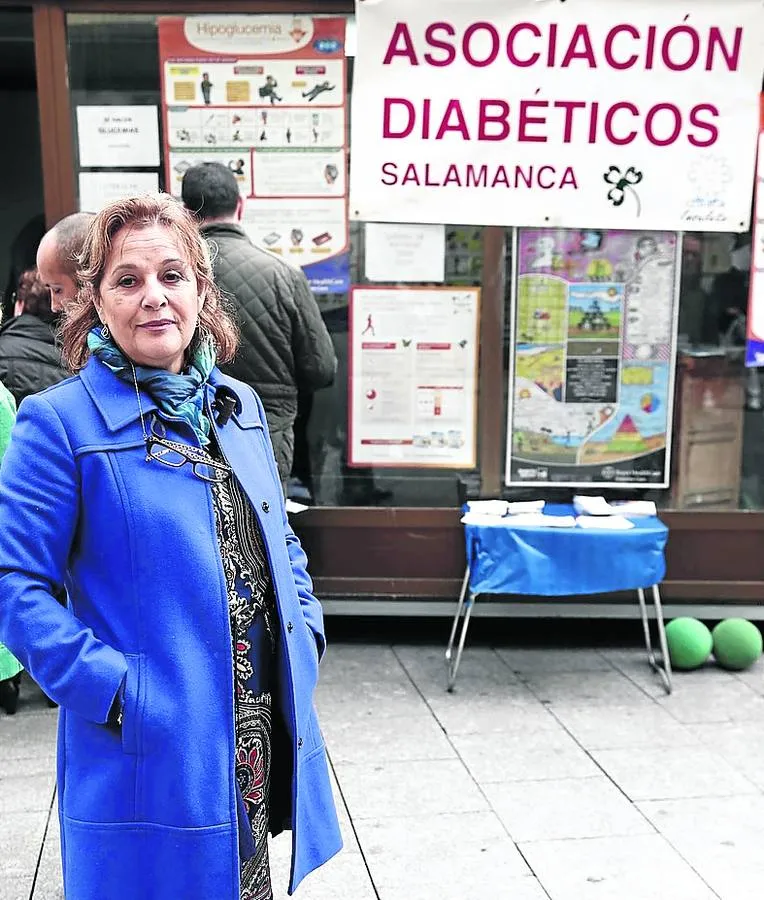Saturday was World Diabetes Day, which is why the Salamanca Diabetological Association (ADS) was both yesterday and the day before yesterday installed in an impromptu information and glymia testing office, in order to measure the levels ofglucose of all those pedestrians who wanted to know their health in this regard.
Apart from this informative campaign at street level, ADS has organized another series of activities so that this disease is visualized more that is so widespread and at the same time in many cases ignored, in fact, "it is not as well known as it should be", "As reported to this newspaper Belén Bernal, president of the Diabetological Association of Salamanca, who declared that "it is estimated that 14% of the population suffers from it, although 6% of the people who suffer from it are not diagnosed", or what it isThe same, they do not know that they have diabetes.
Belén Bernal is what they know as "type three diabetic, that we are family members or those who are somehow next to the person," she explains, because she is a person with diabetes in addition to being the president of theFederation of Diabetological Associations of Castilla y León.
The reviews are very important, so much so that from the test center that provisionally installed ADS this end of the week in the Plaza del Liceo, many high blood glucose levels have been detected, which is why from this association they recommend attending them as soon as possibleto its health center.
This means that many times the symptoms of diabetes go unnoticed.Some of them are, «especially in type one diabetes, be very thirst and as a consequence drink a lotLittle more overlapping, with which there are many people who have diabetes of this type and do not know, ”explains Bernal.
There are those who suffer from gestational diabetes, others type 1 or type 2, but "it is not a better than the other," says Bernal.What is important in all of them is care, since for example "type 2 diabetes can be corrected by 70% with a balanced diet and physical exercise, that is, without sedentary lifestyle," type 1 does not have this possibilityof prevention, but the care of these habits favors a better quality of life, because "if they have a diabetological education and are well controlled, the quality of life of a person with diabetes can be identical to that of another person who does not suffer from it", Remember Belén Bernal.
In this sense Salamanca is privileged within Castilla y León, since it has educators in pediatrics and adults, while in other provinces of the region there are certain shortcomings.
From the Salamanca Diabetological Association they contribute their grain of sand in this area to educate, for example with conferences almost every month to form and inform the person with diabetes and their relatives, they have an endocrine every Tuesday, they carry out activities with children,With adults, with parents and children.They are also the link between the administration and the person with diabetes.
The campaign they have done is to celebrate World Diabetes Day and taking advantage of the same "give information, give visibility to the association and raise awareness among people with diabetes", because on the one hand "many people do not know they have it" andMany of those who have it do not take care of how they should an example is that only 500 people are those who are part of the ADS association.It is an important number but is reduced to less than 3% of the diabetic people of Salamanca.
This day also serves to claim, the diabetics have their struggles, the main one is against discrimination, since, «the diabetic person is still discriminated against, in areaslike work or school, ”recalls Belén Bernal.
On the other hand, thanks to the commitment of the ADS, things are getting, for example in Castilla y León people with diabetes in principle had a concern in relation to refractometer, which is the instrument that people use with this disease to become glycemia, that is, to measure the sugar levels they have in blood at a given time.
Bernal declares that after having gathered with the Concierge of Health, "it seems that they are solving the problem" and that they will continue as they are, that is, "that each person will use the refractometer that best suits their needs».


